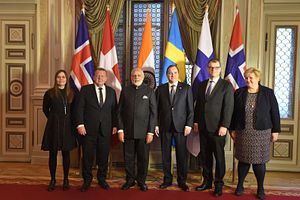During Prime Minister Narendra Modi’s visit to Stockholm last week, the first in 30 years, in addition to bilateral meetings with the prime ministers of Denmark, Finland, Iceland, Norway, and Sweden (the Nordic states), India and Sweden also co-hosted the first ever India-Nordic Summit. The summit, which explored areas for practical cooperation and strategic convergence between both sides, represents a fundamentally new approach toward the relationship.
Discussions during the summit focused on boosting trade, investment, and expanding mutually beneficial collaboration in areas where Nordic strengths match with India’s developmental needs. India and the Nordic states underlined the importance of the rules-based multilateral trading system that enables free international trade and inclusive growth. Both sides also identified the opportunities thrown up by the Nordic model of innovation and their expertise in areas such as clean technologies and environmental conservation, maritime infrastructure and development, military technology and engineering products, agriculture and food processing, health and biotechnology, etc. These provide synergies for India’s skilled workforce and fit in with India’s ambitious development agenda, which includes flagship programs such as Start-up India, Clean India, and Make in India. Commercial engagement between both sides, which has been a significant driving force for their ties over the years, can also benefit from these opportunities.
Both sides also discussed their common positions on strategic issues, including reforming international institutions and strengthening global nonproliferation objectives. Given their shared interest in making the United Nations (UN) Security Council more representative, in the permanent and nonpermanent categories, the Nordic states expressed support for India’s bid for permanent membership of the body. Recognizing India as a responsible nuclear actor, in stark contrast to their stance on India’s nuclear program post-Pokhran-II, the Nordic states also expressed support for India’s membership of the Nuclear Suppliers’ Group.
The summit’s main achievement, however, is that it breaks with the past tradition of ties between India and the Nordic states being conducted at the bilateral level only. This is symbolic of a new modus operandi as both sides reimagine their engagement. The Nordic states’ willingness to engage with other actors as a group, which improves their collective bargaining power, is a recent development. Despite a long history of Nordic cooperation, they have worked together on foreign and security policy only in the post-Cold War period. However, this mostly remained limited to coordinating their actions and standpoints on international issues. The first step toward changing this was taken with the adoption of a vision declaration by the Nordic Ministers for Cooperation in October 2014, Together We Are Stronger. The declaration laid stress on the importance of an outward-looking Nordic region and on the significance of “joint Nordic experiences” for other players in the international system given the increasing importance of regional collaboration.
The summit with India is just the third of its kind – two U.S.-Nordic Leaders Summits were previously held in September 2013 in Stockholm and in May 2016 in Washington.
On the other side, amid growing uncertainties in the multipolar world, India has been pursuing an increasingly energetic foreign policy. This includes renewed attention to Europe, particularly the smaller states that have hitherto stayed under New Delhi’s radar. Among these, the Nordic states, though small, are among the wealthiest in the world, exercise considerable influence at the international level, and form the most integrated region. Recognizing this, in the run up to the summit meeting, the Ministry of External Affairs explained its new strategy — to approach the Nordic region as a whole rather than as five distinct entities because of the similarities among the countries and ease of mobility across the region.
India’s Nordic diplomacy also has an eye toward the Arctic. As climate change melts the Arctic ice caps, the region is gaining in global importance because of its natural resources and the opening up of new (and shorter) shipping routes between the Pacific and Atlantic Oceans. Beyond commercial and maritime opportunities, India’s interest in the region also stems from the adverse impact of climate change on ice covers and glaciers in both the Arctic and the Himalayas. Scientific cooperation on Arctic issues has thus formed an important part of India’s bilateral engagement with Norway and Iceland over the years. The Nordic states too recognize India’s and other Asian states’ growing involvement in Arctic affairs and supported their admittance as permanent observers in the Arctic Council in 2013. There is room to expand India’s bilateral initiatives to engage all five Nordic states collectively to step up India’s influence in the region given its scientific and geopolitical interests.
India’s cooperation with the Nordic states carries tremendous potential for expanding their already vibrant economic ties and helping India learn from the latter’s success in innovation, marrying social welfare with a competitive economy, and sustainable development. Both sides are also brought together by their shared democratic values and support for the multilateral rules-based order. Given their shared interests, both sides should work together to ensure that the recently held summit, instead of being a one off, leads to continued collective engagement between India on the one hand and the five Nordic states on the other.
Sharanya Rajiv is a program assistant at Carnegie India.

































